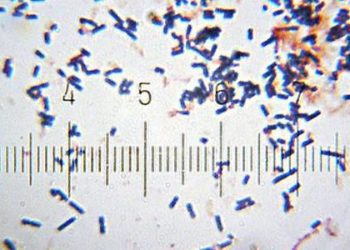#VisualAbstract: Probiotics not effective at reducing incidence of ventilator-associated pneumonia in critically ill patients
- The administration of the probiotic Lactobacillus rhamnosusGG resulted in no significant difference compared to placebo in the development of ventilator-associated pneumonia in critically ill patients requiring mechanical ventilation.
- The findings do not support the use of Lactobacillus rhamnosusGG for the prevention of ventilator-associated pneumonia or other clinically important outcomes in critically ill patients.
Evidence Rating Level: 1 (Excellent)
Study Rundown: The use of probiotics to treat or prevent various infectious, inflammatory, and autoimmune conditions has emerged as a biologically plausible regimen in recent years with postulated mechanisms of benefit including enhanced gut barrier function, competitive inhibition of pathogenic bacteria, and modulation of the host inflammatory response. However, their efficacy in critically ill patients is unclear, with reports of both probiotics as a possible source associated with infections but also reducing infections, particularly ventilator-associated pneumonia (VAP). This multicenter trial sought to determine whether Lactobacillus rhamnosus GG, in comparison with placebo, reduced VAP and other infections and clinically important outcomes for a broad range of critically ill patients in the intensive care unit (ICU). The main endpoint of the analysis was VAP determined by duplicate blinded central adjudication. Secondary measures included other ICU-acquired infections, diarrhea, antimicrobial use, ICU and hospital length of stay, and mortality. Among 2,650 patients randomized 1:1 to receive enteral L rhamnosus GG or placebo in the ICU, no significant difference in VAP incidence was observed in patients treated with probiotics compared with placebo (21.9% vs 21.3%, respectively; HR 1.03; 95%CI 0.87-1.22). These results suggested that compared to placebo, administration of the probiotic L rhamnosus GG resulted in no significant difference in the development of VAP in critically ill patients requiring mechanical ventilation. Furthermore, the findings do not support the use of L rhamnosus GG for the prevention of VAP or other clinically important outcomes in critically ill patients. A limitation of this study was that it was not possible to examine respiratory microbiota over the length of ICU stay between the 2 groups or quantify the colonization of probiotic gastrointestinal microbiota in this study.
Click to read the study in JAMA
Relevant Reading: Efficacy of probiotics in the prevention of VAP in critically ill ICU patients: an updated systematic review and meta-analysis of randomized control trials
In-Depth [randomized controlled trial]: This randomized placebo-controlled trial included 2,653 adult patients (mean age, 59.8 years [SD], 16.5 years; 1,063 women [40.1%]) predicted to require mechanical ventilation for at least 72 hours from 44 ICUs in Canada, the United States, and Saudi Arabia between October 2013 to March 2019, with final follow-up in October 2020. Patients were randomized to receive either enteral L rhamnosus GG (1 x 1010 colony-forming units, n = 1321) or placebo (n = 1332) twice daily in the ICU. In total, 2,650 (99.9%) patients completed the trial with a mean Acute Physiology and Chronic Health Evaluation II score of 22.0 (SD, 7.8) and received the study product for a median of 9 days (IQR, 5-15 days). Among 1,318 patients receiving probiotics, 289 (21.9%) developed VAP compared to 284 of 1332 controls (21.3%; HR, 1.03 (95%CI, 0.87-1.22; P = .73, absolute difference, 0.6%, 95%CI, -2.5%to 3.7%). There was no statistically significant difference in any of the secondary outcomes, including other ICU-acquired infections, diarrhea, antimicrobial use, mortality, or length of stay showed a significant difference. Adverse events related to L rhamnosus in a sterile/non-sterile site occurred in 15 patients (1.1%) in the group receiving probiotics compared to 1 (0.1%) in the control group (OR, 14.02; 95%CI, 1.79-109.58; P < .001).
Image: PD
©2021 2 Minute Medicine, Inc. All rights reserved. No works may be reproduced without expressed written consent from 2 Minute Medicine, Inc. Inquire about licensing here. No article should be construed as medical advice and is not intended as such by the authors or by 2 Minute Medicine, Inc.






